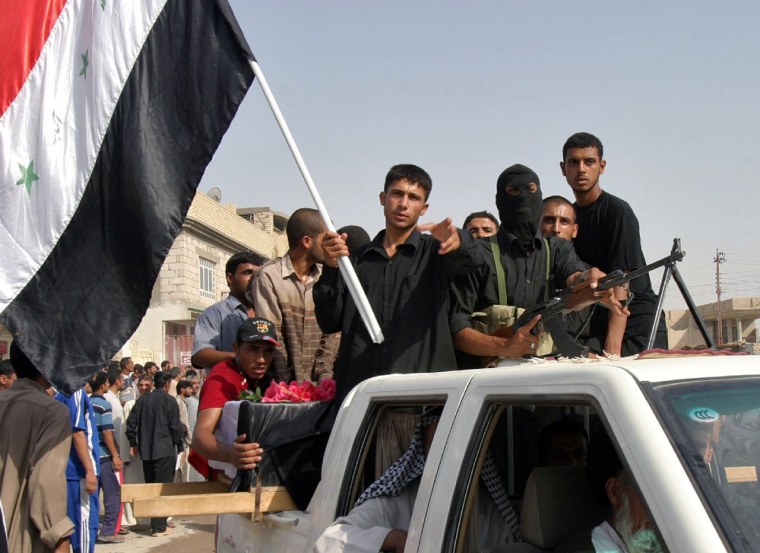A U.S. and Iraqi raid to arrest a rogue Shiite militia leader sparked a fierce battle in the holy city of Karbala Friday that led to a U.S. airstrike and left some 17 militants dead, the military said.
The joint force moved in before dawn to detain a man described as the commander of a breakaway group of the powerful Mahdi Army, along with two other suspects.
The raid went off without incident, but the troops came under fire as they left the area with their prisoners, the military said. Attackers fired small arms, machine guns and rocket-propelled grenades from three locations. Five militants were killed in the fighting, the military said.
Militants fired on a helicopter assisting the operation and U.S. special forces called in attack aircraft, which launched an airstrike that killed about a dozen more militants, the U.S. military said.
The military said no civilians were in the area, but local Iraqi officials said nine people were killed, including four militiamen and five civilians, and 23 people were wounded.
The military said their main target was a Mahdi Army assassination cell that had broken off from the mainstream organization, which is loyal to radical Shiite cleric Muqtada al-Sadr.
The military accused the man, whom it did not name, of being behind roadside bomb and mortar attacks against U.S. forces, as well as the assassinations of two Iraqi government officials.
Raid target detained
A local policeman and a council member said that a militia leader by the name of Razzaq al-Ardhi had been detained along with his brother.
The officials, who spoke on condition of anonymity because they weren’t authorized to release the information, said another clash erupted about three hours later in Karbala, 50 miles south of Baghdad, as residents were removing the dead bodies from the hospital. Militiamen accompanying the mourners briefly fought with a joint Iraqi army and police patrol, but no casualties were reported, the officials said.
U.S. and Iraqi officials have said they are unsure of the degree of control the anti-American cleric still exerts over his militia, which he founded in 2003 after the collapse of Saddam Hussein’s rule. The Mahdi Army engaged in fierce battles with U.S. troops in 2004 but last year al-Sadr complained publicly about “deviant” groups using his organization as a cover for murder, extortion and smuggling.
Northeast of Baghdad, U.S. forces captured four militants they called linked to networks that smuggle weapons and fighters from Iran.
The raid in the village of Qasarin, 10 miles north of Baqouba, was targeting a “highly sought operative believed to be a senior leader of a weapons smuggling network,” the statement said, although it did not specify whether he was among those captured.
The men were suspected of helping to smuggle fighters and weapons including armor-piercing bombs known as explosively formed penetrators. The powerful roadside devices have killed hundreds of U.S. troops in recent months.
Roadside bomb kills U.S. soldier
The military announced separately that a U.S. soldier had been killed by a roadside bomb in restive Diyala province, from which the U.S. military is trying to drive Sunni and Shiite extremists. U.S. and Iraqi forces recently struck an alliance with Sunni insurgent groups and tribal leaders opposed to al-Qaida in Iraq as part of that effort.
A representative of Iraq’s top Shiite cleric, Grand Ayatollah Ali al-Sistani, called on the government to broaden the effort beyond Sunnis by rallying all of the groups in Diyala to jointly fight the terrorist group.
“We call on the government to form a collective in Diyala province from Sunnis, Shiites and Turkoman and other sects of Iraqis to give these operations a national dimension to fight Al-Qaida organization in the name of Iraq,” Sheik Abdul-Mahdi al-Karbalai said in a sermon in Karbala’s Imam Hussein mosque hours after the U.S. raid.
In Baghdad, cleanup crews used tractors and cranes to clear out the debris from a highly sophisticated simultaneous truck bombing and rocket attack on a Shiite market district in one of the capital’s safest central neighborhoods Thursday. Rescue workers pulled three more bodies from the rubble, and police raised the casualty toll to at least 31 people killed and 104 wounded.
U.S. troops harassed
Mourners streamed into mosques and funeral tents were set up in the neighborhood’s main street, where black banners were hung on the walls bearing the names of the dead.
Residents angry about the lack of security in the neighborhood — which was hit by a double car-bombing earlier this week —threw stones and empty cans at U.S. soldiers arriving at the scene of the blast, according to a police officer and a witness, who declined to be identified because they feared retribution.
The soldiers left the area.
The officer and witness said Iraqi soldiers met with the same response when they arrived about 10 minutes later, prompting them to open fire to disperse the crowd. No casualties were reported.
At least 65 U.S. troops have died this month, a relatively low number compared with American death tolls of more than 100 for each of the previous three months, according to an AP count based on military statements.
In other violence, a roadside bomb exploded in Muqdadiyah, about 60 miles north of Baghdad, killing five civilians, police said.
